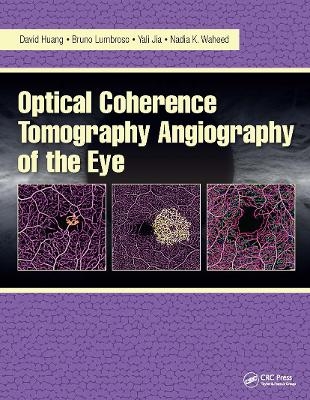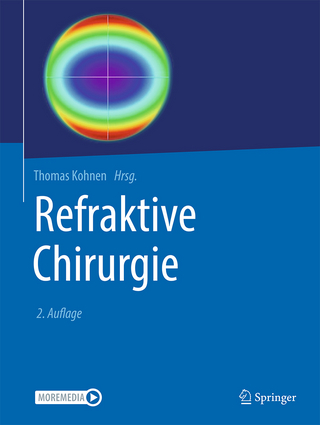
Optical Coherence Tomography Angiography of the Eye
SLACK Incorporated (Verlag)
978-1-63091-282-6 (ISBN)
- Lieferbar (Termin unbekannt)
- Versandkostenfrei
- Auch auf Rechnung
- Artikel merken
Inside Optical Coherence Tomography Angiography of the Eye Drs. David Huang, Bruno Lumbroso, Yali Jia, and Nadia Waheed include detailed information on clinical applications and fundamental principles needed to understand and use this new technology. This includes information on high-speed OCT systems, algorithms to extract flow contrast, the appearance of the normal eye, the findings in myriad diseases, and tips on how to deal with artifact and pitfalls.
The 3-dimensional nature of OCT angiography provides visualization that was not possible before with either FA or ICG and readers will come to appreciate how this enables the visualization of previously difficult to image vascular beds such as the 4 retinal vascular plexuses (radial peripapillary, superficial, intermediate, and deep), the choriocapillaris, and the deeper choroidal vessels.
Given its noninvasive nature and ease of use, OCT angiography imaging is rapidly taking an important place in everyday ophthalmology and may soon replace fluorescein angiography in everyday practice.
Optical Coherence Tomography Angiography of the Eye is designed to be the definitive text on this cutting-edge technology for the retina specialist and comprehensive ophthalmologist.
David Huang, MD, PhD is the Peterson Professor of Ophthalmology and Professor of Biomedical Engineering at the Oregon Health & Science University (Portland, Oregon). Dr. Huang received an MD from Harvard University (Cambridge, Massachusetts) and a PhD from Massachusetts Institute of Technology (Cambridge, Massachusetts). He completed an ophthalmology residency at the Doheny Eye Institute/University of Southern California (Los Angeles, California) and cornea fellowship at Emory University (Atlanta, Georgia). Dr. Huang is a co-inventor of optical coherence tomography (OCT), which is the most commonly used ophthalmic imaging technology at 30 million procedures per year. More recently he has pioneered anterior segment OCT and OCT angiography. His seminal article on OCT, published in Science in 1991, has been cited more than 11,000 times. He has 19 issued patents and 18 pending patents in the areas of OCT, mobile health testing, tissue engineering and corneal laser surgery. He has been the principal investigator of 5 NIH research grants totaling over $20 million. He has published more than 200 peer-reviewed articles with nearly 40,000 citations. He has edited 8 books. Dr. Huang has received the Champalimaud Vision Award, the Jonas Friedenwald Award, the David Epstein Award from the Association for Research in Vision & Ophthalmology, the Senior Achievement Award from the American Academy of Ophthalmology, and the Fritz & Dolores Russ Award from the National Academy of Engineering (USA). He is a fellow of the American Academy of Inventors and American Ophthalmological Society. Dr. Huang leads the Center for Ophthalmic Optics and Lasers (www.COOLLab.net). He is a founder of Gobiquity Mobile Health, Inc. (www.gobiquity.com), a maker of mobile diagnostic apps. Bruno Lumbroso, MD has been Director of the Department of Ophthalmology of the Rome Eye Hospital (Rome, Italy) and Professor LD of Clinical Ophthalmology at the University of Rome La Sapienza (Rome, Italy) for more than 35 years. He is now Directorof the private Centro Italiano Macula in Rome, Italy. He was a pioneer in the development of clinical applications for en face OCT and OCT angiography. He is co-founder and General Secretary of the Societa Italiana di Angiografia OCT and of the Societa Italiana di Laser in Oftalmologia. His main interests are in logical methods of retinal imaging analysis and interpretation, and in clinical applications of OCT and OCT angiography technology for retinal disorders. Yali Jia, PhD is an Assistant Professor of Ophthalmology and Biomedical Engineering at the Oregon Health & Science University (OHSU) in Portland, Oregon. Dr. Jia earned her PhD in Biomedical Engineering from OHSU in 2010 under the guidance of Dr. Ruikang Wang. Dr. Jia completed her post-doctoral training with Dr. David Huang at Casey Eye Institute in 2013. She developed split-spectrum amplitude de-correlation angiography (SSADA), a highly efficient optical coherence tomography angiography (OCTA) algorithm that made clinical OCTA practical. Her article on SSADA, published in Optics Express in 2012, has been cited more than 430 times. Dr. Jia was awarded 3 National Institute of Health research project grants that supported the initial works that demonstrated clinical applications of OCTA in retinal diseases. She is the technical leader in Casey Reading Center. Her OCTA reading software (COOL-ART) has been used by several large clinical studies and many international collaborators. She has published 75 peer-reviewed journal articles and 25 book chapters; and co-edited 3 books. Her major contributions to the OCTA community are: efficient OCTA, quantitative OCTA, projection-resolved OCTA and motion-free OCTA. Nadia K. Waheed, MD, MPH is Director of the Boston Image Reading Center and Associate Professor in Ophthalmology at the Tufts University School of Medicine (Boston, Massachusetts). She specializes in clinical and clinical trial applications of optical coherence tomography and optical coherence tomography angiography.
Dedication Acknowledgments About the Editors Contributing AuthorsIntroduction Part I: Principles and Methods Chapter 1 Optical Coherence Tomography Systems for Angiography Gangjun Liu, PhD; Alex D. Pechauer, BS; David Huang, MD, PhD; and James G. Fujimoto, PhD Chapter 2 Optical Coherence Tomography Angiography Algorithms Yali Jia, PhD; Simon S. Gao, PhD; and David Huang, MD, PhD Chapter 3 Cross- Sectional and En Face Visualization of Posterior Eye Circulations Yali Jia, PhD; Bruno Lumbroso, MD; Simon S. Gao, PhD; David Huang, MD, PhD; and David J. Wilson, MD Chapter 4 Cross- Sectional and En Face Visualization of Normal Anterior Eye Circulations Yan Li, PhD; Yali Jia, PhD; David Huang, MD, PhD; and Alison H. Skalet, MD, PhD Chapter 5 Artifacts in Optical Coherence Tomography Angiography Simon S. Gao, PhD; Yali Jia, PhD; and David Huang, MD, PhD Chapter 6 Quantification Yali Jia, PhD; Acner Camino, PhD; Miao Zhang, PhD; Simon S. Gao, PhD; and David Huang, MD, PhD Chapter 7 Optical Coherence Tomography Angiography: TerminologyDavid Huang, MD, PhD and Simon S. Gao, PhD Chapter 8 Optical Coherence Tomography Angiography on the Optovue AngioVue With Split-Spectrum Amplitude-Decorrelation Angiography and DualTrac Motion Correction Tony Ko, PhD and Jay Wei, MS Chapter 9 Optical Coherence Tomography Angiography: Optical Microangiography Ruikang K. Wang, PhD; Qinqin Zhang, PhD; Giovanni Gregori, PhD; and Philip J. Rosenfeld, MD, PhD Chapter 10 Optical Coherence Tomography Angiography Imaging With Topcon's One-Micrometer Wavelength Swept Source Optical Coherence TomographyCharles Reisman, MS; Atsushi Kubota, MS; Masahiro Akiba, PhD; Catharine Chisholm, PhD; and Michael J. Sinai, PhD Chapter 11 Spectral Domain Optical Coherence Tomography Angiography Using NIDEK RS-3000 AdvanceMayss Al-Sheikh, MD and SriniVas R. Sadda, MD Part II: Retinal Diseases Chapter 12 Exudative Neovascular Age-Related Macular Degeneration Type 1, 2, and Mixed Choroidal Neovascularization Bruno Lumbroso, MD; Steven T. Bailey, MD; Yali Jia, PhD; Marco Rispoli, MD; and Maria Cristina Savastano, MD Chapter 13 Short- and Long-Term Response of Choroidal Neovascularization to Anti-Angiogenic Treatment Bruno Lumbroso, MD; Steven T. Bailey, MD; Yali Jia, PhD; Marco Rispoli, MD; and Maria Cristina Savastano, MD Chapter 14 Nonexudative Neovascular Age-Related Macular Degeneration Steven T. Bailey, MD; Ching J. Chen, MD; and Yali Jia, PhD Chapter 15 Type 3 Neovascularization—Retinal Angiomatous ProliferationAnna C.S. Tan, MBBS, FRCSED; Kunal K. Dansingani, MA, FRCOphth; and K. Bailey Freund, MD Chapter 16 Non-Neovascular Age-Related Macular DegenerationRicardo N. Louzada, MD; Nadia K. Waheed, MD, MPH; Jay S. Duker, MD; and Mark Lane, MBBS Honors Chapter 17 Polypoidal Choroidal Vasculopathy Min Wang, MD, PhD; Simon S. Gao, PhD; and Yali Jia, PhD Chapter 18 Optical Coherence Tomography Angiography of Macular Telangiectasia Type 2 Ching J. Chen, MD; Brian Tieu, MD, PhD; and Matthew Olson, CRA Chapter 19 Central Serous Chorioretinopathy Eduardo A. Novais, MD; Mark Lane, MBBS Honors; Nadia K. Waheed, MD, MPH; and Jay S. Duker, MD Chapter 20 Choroidal Neovascularization of Other Causes Brian K. Do, MD; Richard I. Kaplan, MD; Patricia Garcia, MD; Andre Romano, MD; and Richard Rosen, MD; Chapter 21 Nonproliferative Diabetic Retinopathy Thomas Hwang, MD; Yali Jia, PhD; Miao Zhang, PhD; and David J. Wilson, MD Chapter 22 Proliferative Diabetic Retinopathy Emily D. Cole, BS; Nadia K. Waheed, MD, MPH; and Jay S. Duker, MD Chapter 23 Retinal Venous Occlusion Marco Rispoli, MD and Bruno Lumbroso, MD Chapter 24 Retinal Arterial Occlusion Xiaogang Wang, MD, PhD; Jing Dong, MS; and Yading Jia, BS Chapter 25 Inherited Retinal Degenerations Rachel Patel, MD; Simon S. Gao, PhD; Paul Yang, MD, PhD; Richard G. Weleber, MD; David J. Wilson, MD; and Mark Pennesi, MD, PhD Chapter 26 Pathological MyopiaLeonardo Mastropasqua, MD and Luca Di Antonio, MD, PhD Chapter 27 Flow Characteristics in Retinal Vasculitis Using Optical Coherence Tomography AngiographyPhoebe Lin, MD, PhD; Miao Zhang, PhD; and Liang Liu, MD Chapter 28 White Dot Syndromes Philipp K. Roberts, MD; Lee Jampol, MD; and Amani A. Fawzi, MD Chapter 29 Optical Coherence Tomography Angiography in Choroiditis, Retinitis, and Vasculitis Andre Romano, MD; Rubens Belfort Jr, MD, PhD; and Daniela Ferrara, MD, PhD Chapter 30 Melanocytic TumorsAlison H. Skalet, MD, PhD; David Huang, MD, PhD; Yali Jia, PhD; and Yan Li, PhD Chapter 31 Radiation Maculopathy Alexandre Matet, MD; Aude Ambresin, MD; Gilda Cennamo, MD; and Leonidas Zografos, MD Part III: Optic Nerve Diseases Chapter 32 Optical Coherence Tomography Angiography in Primary Open-Angle Glaucoma David Huang, MD, PhD; Liang Liu, MD; and Michel Puech, MD, MSC Chapter 33 Primary Angle-Closure GlaucomaChunhui Jiang, MD, PhD and Xinghuai Sun, MD, PhD Chapter 34 Neurodegenerative DiseasesAlbert J. Augustin, MD and Christian Dempe Part IV: Anterior Diseases Chapter 35 Angiography of the Cornea Using Optical Coherence Tomography Winston Chamberlain, MD, PhD; Afshan Nanji, MD, MPH; David Huang, MD, PhD; and Yan Li, PhDFinancial Disclosures Index
| Erscheinungsdatum | 18.08.2017 |
|---|---|
| Verlagsort | Thorofare |
| Sprache | englisch |
| Maße | 216 x 279 mm |
| Gewicht | 560 g |
| Themenwelt | Medizin / Pharmazie ► Medizinische Fachgebiete ► Augenheilkunde |
| ISBN-10 | 1-63091-282-4 / 1630912824 |
| ISBN-13 | 978-1-63091-282-6 / 9781630912826 |
| Zustand | Neuware |
| Haben Sie eine Frage zum Produkt? |
aus dem Bereich


